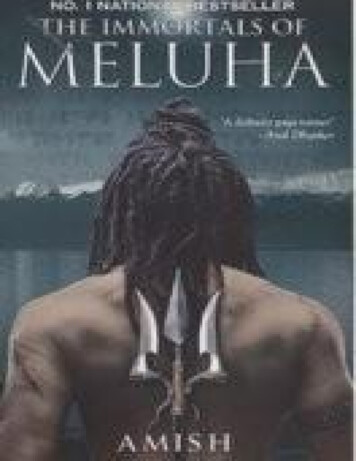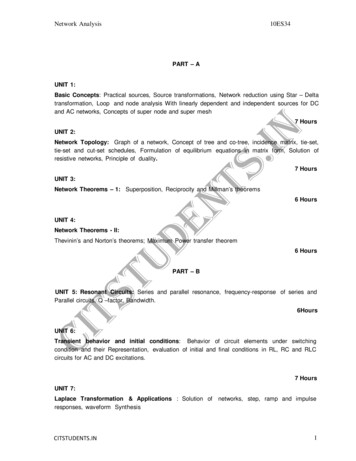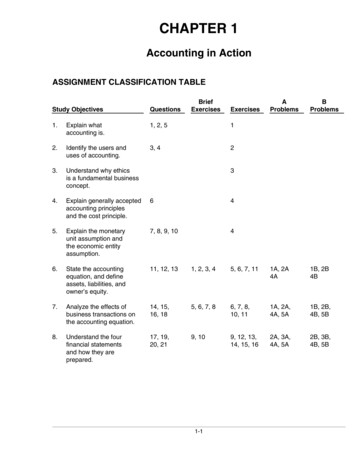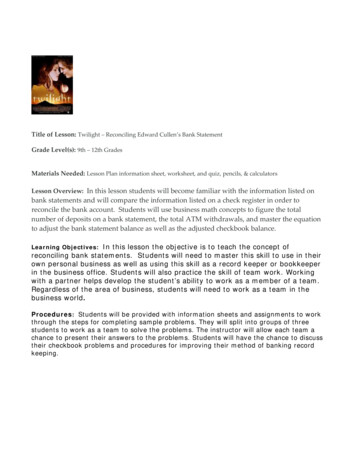
Transcription
Praise forThe Immortals of Meluha‘Shiva rocks. Just how much Shiva rocks the imagination is made grandiosely obvious in TheImmortals of Meluha. Shiva’s journey from cool dude. to Mahadev. is a reader’s delight.What really engages is the author’s crafting of Shiva, with almost boy-worship joy’— The Times of India‘The story is gripping and well-paced. An essentially mythological story written in a modernstyle, the novel creates anticipation in the readers mind and compels one to read with greatcuriosity till the end. The end however is a cliff-hanger and leaves one thirsting for more.’— Business World‘Amongst the top 5 books recommended by Brunch. the story is fascinating.’— The Hindustan Times‘.has philosophy as its underlying theme but is racy enough to give its readers theadventure of a lifetime.’— The Hindu‘Amongst the list of favourite holiday books of 2010. A fast paced story, you are bound toread it cover to cover in one sitting.’— The Deccan Chronicle‘Much before the box-office verdict on Rajneeti and Raavan became apparent, Indianreaders gave a thumbs-up to The Immortals Of Meluha. Its author Amish, an IIM graduate,created a delightful mix of mythology and history by making Lord Shiva the hero of his trilogy.The first part has been on the Indian bestseller charts for quite some time now.’— The Indian Express
‘.to me, The Immortals of Meluha is a political commentary with messages for our worldand a hope that since they flow from the Mahadev himself, they will find greater acceptance.Be it the interpretation of Shiva’s battle cry — Har Har Mahadev as Every man a Mahadev orthe valour of Sati who fights her own battles — every passage is rich in meaning and yet, opento interpretation. Therein lies the strength of this book.’— Indiareads.com‘.wonderful book, replete with action, love and adventure, and extolling virtues andprinciples. The author has succeeded in making many mythological figures into simple fleshand blood human beings, and therein lie(s) the beauty and the acceptability of this book.’— The Afternoon‘The author takes myth and contemporises it, raising questions about all that we hold trueand familiar. The book is (a) marvellous attempt to create fiction from folklore, religion andarchaeological facts.’— People‘The Immortals of Meluha. sees Lord Shiva and his intriguing life with a refreshingperspective. beautifully written creation. Simply unputdownable for any lover of Indian historyand mythology.’— SocietyFor detailed reviews, please visit www.shivatrilogy.com
westland ltdVenkat Towers, 165, P.H. Road, MaduravoyaLChennai 600 095No.38/10 (New No.5), Raghava Nagat, New Timber Yard Layout,Bangalore 560 026Survey No. A-9, II Floor, Moula Ali Industrial Area, Moula Ali,Hyderabad 500 04023/181, Anand Nagar, Nehru Road, Santacruz East, Mumbai 400 0554322/3, Ansari Road, Daryaganj, New Delhi 110 002First published by Tara Press 2010Published by westland ltd 2010Copyright Amish Tripathi 2008All rights reservedAmish Tripathi asserts the moral right to be identified as the author of this work.This is a work of fiction. Names, characters, places and incidents are either the product ofthe author’s imagination or are used fictitiously and any resemblance to any actual person livingor dead, events and locales is entirely coincidental.Cover Design by Rashmi Pusalkar.Photo of Lord Shiva by Vikram Bawa.Photo of Kailash Mansarovar by Silvio Giroud.Typeset in Garamond by ManjuPrinted at Manipal Technologies Ltd., ManipalThis book is sold subject to the condition that it shall not, by any way of trade orotherwise, be lent, resold, hired out, or otherwise circulated without the author’s prior writtenconsent, in any form of binding or cover other than that in which it is published and without asimilar condition including this condition being imposed on the subsequent purchaser and withoutlimiting the rights under copyright reserved above, no part of this publication may bereproduced, stored in or introduced into a retrieval system, or transmitted in any form or by any
means (electronic, mechanical, photocopying, recording or otherwise), without the prior writtenpermission of the copyright owner, except in the case of brief quotations embodied in criticalarticles or reviews with appropriate citations.
To Preeti & Neel.You both are everything to me,My words & their meaning,My prayer & my blessing,My moon & my sun,My love & my life,My soul mate & a part of my soul.
Om Namah Shivaiy.The universe bows to Lord Shiva. I bow to Lord Shiva.
ementsThe Shiva Trilogy1 : He has come!2 : Land of Pure Life3 : She Enters His Life4 : Abode of the Gods5 : Tribe of Brahma6 : Vikarma, the Carriers of Bad Fate7 : Lord Ram’s Unfinished Task8 : Drink of the Gods9 : Love and its Consequences10 : The Hooded Figure Returns11 : Neelkanth Unveiled12 : Journey through Meluha13 : Blessings of the Impure14 : Pandit of Mohan Jo Daro15 : Trial by Fire16 : The Sun & Earth17 : The Battle of Koonj18 : Sati and the Fire Arrow19 : Love Realised20 : Attack on Mandar21 : Preparation for War22 : Empire of Evil23 : Dharmayudh, the Holy War24 : A Stunning Revelation25 : Island of the Individual26 : The Question of QuestionsGlossary
AcknowledgementsThey say that writing is a lonely profession. They lie. An outstanding group of people havecome together to make this book possible. And I would like to thank them.Preeti, my wife, a rare combination of beauty, brains and spirit who assisted and advisedme through all aspects of this book.My family, a cabal of supremely positive individuals who encouraged, pushed and supportedme through the long years of this project.My first publisher and agent, Anuj Bahri, for his absolute confidence in the Shiva Trilogy.My present publishers Westland Ltd, led by Gautam Padmanabhan, for sharing a dreamwith me.Sharvani Pandit and Gauri Dange, my editors, for making my rather pedestrian Englishvastiy better and for improving the story flow.Rashmi Pusalkar, Sagar Pusalkar and Vikram Bawa for the exceptional cover.Atul Manjrekar, Abhijeet Powdwal, Rohan Dhuri and Amit Chitnis for the innovative trailerfilm, which has helped market the book at a whole new level. And Taufiq Qureshi, for the musicof the trailer film.Mohan Vijayan for his great work on press publicity.Alok Kalra, Hrishikesh Sawant and Mandar Bhure for their effective advice on marketing andpromotions.Donetta Ditton & Mukul Mukherjee for the website.You, the reader, for the leap of faith in picking up the book of a debut author.And lastly, I believe that this story is a blessing to me from Lord Shiva. Humbled by thisexperience, I find myself a different man today, less cynical and more accepting of differentworld views. Hence, most importantly, I would like to bow to Lord Shiva, for blessing me soabundantly, far beyond what I deserve.
The Shiva TrilogyShiva! The Mahadev. The God of Gods. Destroyer of Evil. Passionate lover. Fiercewarrior. Consummate dancer. Charismatic leader. All-powerful, yet incorruptible. Quick wit,accompanied by an equally quick and fearsome temper.Over the centuries, no foreigner who came to our land — conqueror, merchant, scholar,ruler, traveller — believed that such a great man could possibly exist in reality. They assumedthat he must have been a mythical God, whose existence could be possible only in the realmsof human imagination. Unfortunately, this belief became our received wisdom.But what if we are wrong? What if Lord Shiva was not a figment of a rich imagination, but aperson of flesh and blood? Like you and me. A man who rose to become godlike because ofhis karma. That is the premise of the Shiva Trilogy, which interprets the rich mythologicalheritage of ancient India, blending fiction with historical fact.This work is therefore a tribute to Lord Shiva and the lesson that his life teaches us. Alesson lost in the depths of time and ignorance. A lesson, that all of us can rise to be betterpeople. A lesson, that there exists a potential god in every single human being. All we have todo is listen to ourselves.The Immortals of Meluha is the first book in the trilogy that chronicles the journey of thisextraordinary hero. Two more books are to follow: The Secret of the Nagas and The Oath ofthe Vayuputras.
CHAPTER 1He has come!1900 BC, Mansarovar Lake(At the foot of Mount Kailash, Tibet)Shiva gazed at the orange sky. The clouds hovering above Mansarovar had just parted toreveal the setting sun. The brilliant giver of life was calling it a day once again. Shiva had seen afew sunrises in his twenty-one years. But the sunset! He tried never to miss the sunset! On anyother day, Shiva would have taken in the vista — the sun and the immense lake against themagnificent backdrop of the Himalayas stretching as far back as the eye could see. But nottoday.He squatted and perched his lithe, muscular body on the narrow ledge extending over thelake. The numerous batde-scars on his skin gleamed in the shimmering reflected light of thewaters. Shiva remembered well his carefree childhood days. He had perfected the art ofthrowing pebbles that bounced off the surface of the lake. He still held the record in his tribe forthe highest number of bounces: seventeen.On a normal day, Shiva would have smiled at the memory from a cheerful past that hadbeen overwhelmed by the angst of the present. But today, he turned back towards his villagewithout any hint of joy.Bhadra was alert, guarding the main entrance. Shiva gestured with his eyes. Bhadra turnedback to find his two back-up soldiers dozing against the fence. He cursed and kicked themhard.Shiva turned back towards the lake.God bless Bhadra! At least he takes some responsibility.Shiva brought the chillum made of yak-bone to his hps and took in a deep drag. Any otherday, the marijuana would have spread its munificence, dulling his troubled mind and letting himfind some moments of solace. But not today.He looked left, at the edge of the lake where the soldiers of the strange foreign visitor werekept under guard. With the lake behind them and twenty of Shiva’s own soldiers guarding them,it was impossible for them to mount any surprise attack.They let themselves be disarmed so easily. They aren’t like the bloodthirsty idiots in our landwho are looking for any excuse to fight.The foreigner’s words came flooding back to Shiva. ‘Come to our land. It lies beyond thegreat mountains. Others call it Meluha. I call it Heaven. It is the richest and most powerfulempire in India. Indeed the richest and most powerful in the whole world. Our government hasan offer for immigrants. You will be given fertile land and resources for farming. Today, yourtribe, the Gunas, fight for survival in this rough, arid land. Meluha offers you a lifestyle beyondyour wildest dreams. We ask for nothing in return. Just live in peace, pay your taxes and followthe laws of the land.’
Shiva mused that he would certainly not be a chief in this new land.Would I really miss that so much?His tribe would have to live by the laws of the foreigners. They would have to work everyday for a living.That’s better than fighting every day just to stay alive!Shiva took another puff from his chillum. As the smoke cleared, he turned to stare at the hutin the centre of his village, right next to his own, where the foreigner had been stationed. Hehad been told that he could sleep there in comfort. In fact, Shiva wanted to keep him hostage.Just in case.We fight almost every month with the Pakratis just so that our village can exist next to theholy lake. They are getting stronger every year, forming new alliances with new tribes. We canbeat the Pakratis, but not all the mountain tribes together! By moving to Meluha, we canescape this pointless violence and may be live a life of comfort. What could possibly be wrongwith that? Why shouldn’t we take this deal? It sounds so damn good!Shiva took one last drag from the chillum before banging it on the rock, letting the ash slipout and rose quickly from his perch. Brushing a few specks of ash from his bare chest, hewiped his hands on his tiger skin skirt, rapidly striding to his village. Bhadra and his back-upstood to attention as Shiva passed the gate. Shiva frowned and gestured for Bhadra to easeup.Why does he keep forgetting that he has been my closestfriend since childhood? Mybecoming the chief hasn’t really changed anything. He doesn’t need to behave unnecessarilyservile in front of others.The huts in Shiva’s village were luxurious compared to others in their land. A grown mancould actually stand upright in them. The shelter could withstand the harsh mountain winds fornearly three years before surrendering to the elements. He flung the empty chillum into his hutas he strode to the hut where the visitor lay sleeping soundly.Either he doesn’t realise he is a hostage. Or he genuinely believes that good behaviourbegets good behaviour.Shiva remembered what his uncle, also his Guru, used to say. ‘People do what their societyrewards them to do. If the society rewards trust, people will be trusting.’Meluha must he a trusting society if it teaches even its soldiers to expect the best instrangers.Shiva scratched his shaggy beard as he stared hard at the visitor.He had said his name was Nandi.The Meluhan’s massive proportions appeared even more enormous as he sprawled on thefloor in his stupor, his immense belly jiggling with every breath. Despite being obese, his skinwas taut and toned. His child-like face looked even more innocent asleep, with his mouth halfopen.Is this the man who will lead me to my destiny? Do I really have the destiny my uncle spokeof?‘Your destiny is much larger than these massive mountains. But to make it come true, youwill have to cross these very same massive mountains.’Do I deserve a good destiny? My people come first. Will they be happy in Meluha?Shiva continued to stare at the sleeping Nandi. Then he heard the sound of a conch shell.Pakratis!
‘POSITIONS!’ screamed Shiva, as he drew his sword.Nandi was up in an instant, drawing a hidden sword from his fur coat kept to the side. Theysprinted to the village gates. Following standard protocol, the women started rushing to thevillage centre, carrying their children along. The men ran the other way, swords drawn.‘Bhadra! Our soldiers at the lake!’ shouted Shiva as he reached the entrance.Bhadra relayed the orders and the Guna soldiers obeyed instantly. They were surprised tosee the Meluhans draw weapons hidden in their coats and rush to the village. The Pakratiswere upon them within moments.It was a well-planned ambush by the Pakratis. Dusk was usually a time when the Gunasoldiers took time to thank their gods for a day without battle. The women did their chores bythe lakeside. If there was a time of weakness for the formidable Gunas, a time when theyweren’t a fearsome martial clan, but just another mountain tribe trying to survive in a tough,hostile land, this was it.But fate was against the Pakratis yet again. Thanks to the foreign presence, Shiva hadordered the Gunas to remain alert. Thus they were forewarned and the Pakratis lost theelement of surprise. The presence of the Meluhans was also decisive, turning the tide of theshort, brutal battle in favour of the Gunas. The Pakratis had to retreat.Bloodied and scarred, Shiva surveyed the damage at the end of the battle. Two Gunasoldiers had succumbed to their injuries. They would be honoured as clan heroes. But evenworse, the warning had come too late for at least ten Guna women and children. Theirmutilated bodies were found next to the lake. The losses were high.Bastards They kill women and children when they can’t beat us!A livid Shiva called the entire tribe to the centre of the village. His mind was made.‘This land is fit for barbarians! We have fought pointless battles with no end in sight. Youknow my uncle tried to make peace, even offering access to the lake shore to the mountaintribes. But these scum mistook our desire for peace as weakness. We all know what followed!’The Gunas, despite being used to the brutality of regular battle, were shell-shocked by theviciousness of the attack on the women and children.‘I keep nothing secret from you. All of you know the invitation of the foreigners,’ continuedShiva, pointing to Nandi and the Meluhans. ‘They fought shoulder-to-shoulder with us today.They have earned my trust. I want to go with them to Meluha. But this cannot be my decisionalone.’‘You are our chief, Shiva,’ said Bhadra. ‘Your decision is our decision. That is the tradition.’‘Not this time,’ said Shiva holding out his hand. ‘This will change our lives completely. Ibelieve the change will be for the better. Anything will be better than the pointlessness of theviolence we face daily. I have told you what I want to do. But the choice to go or not is yours.Let the Gunas speak. This time, I follow you.’The Gunas were clear on their tradition. But the respect for Shiva was not just based onconvention, but also on his character. He had led the Gunas to their greatest military victoriesthrough his genius and sheer personal bravery.They spoke in one voice. ‘Your decision is our decision.’
It had been five days since Shiva had uprooted his tribe. The caravan had camped in a nookat the base of one of the great valleys dotting the route to Meluha. Shiva had organized thecamp in three concentric circles. The yaks had been tied around the outermost circle, to act asan alarm in case of any intruders. The men were stationed in the intermediate ring to fight ifthere was a battle. And the women and children were in the innermost circle, just around thefire. Expendable first, defenders second and the most vulnerable at the inside.Shiva was prepared for the worst. He believed that there would be an ambush. It was only amatter of time.The Pakratis should have been delighted to have access to the prime lands, as well as freeoccupation of the lake front. But Shiva knew that Yakhya, the Pakrati chief, would not allowthem to leave peacefully. Yakhya would like nothing better than to become a legend by claimingthat he had defeated Shiva’s Gunas and won the land for the Pakratis. It was precisely thisweird tribal logic that Shiva detested. In an atmosphere like this, there was never any hope forpeace.Shiva relished the call of battle, revelled in its art. But he also knew that ultimately, thebattles in his land were an exercise in futility.He turned to an alert Nandi sitting some distance away. The twenty-five Meluhan soldierswere seated in an arc around a second camp circle.Why did he pick the Gunas to immigrate? Why not the Pakratis?Shiva’s thoughts were broken as he saw a shadow move in the distance. He stared hard,but everything was still. Sometimes the light played tricks in this part of the world. Shiva relaxedhis stance.And then he saw the shadow again.‘TO ARMS!’ screamed Shiva.The Gunas and Meluhans drew their weapons and took up battle positions as fifty Pakratischarged in. The stupidity of rushing in without thought hit them hard as they met with a wall ofpanicky animals. The yaks bucked and kicked uncontrollably, injuring many Pakratis before theycould even begin their skirmish. A few slipped through. And weapons clashed.A young Pakrati, obviously a novice, charged at Shiva, swinging wildly. Shiva stepped back,avoiding the strike. He brought his sword back up in a smooth arc, inflicting a superficial cut onthe Pakrati’s chest. The young warrior cursed and swung back, opening his flank. That was allShiva needed. He pushed his sword in brutally, cutting through the gut of his enemy. Almostinstantly, he pulled the blade out, twisting it as he did, and left the Pakrati to a slow, painfuldeath. Shiva turned around to find a Pakrati ready to strike a Guna. He jumped high and swungfrom the elevation slicing neatly through the Pakrati’s sword arm, severing it.Meanwhile Bhadra, as adept at the art of battle as Shiva, was fighting two Pakratissimultaneously, with a sword in each hand. His hump did not seem to impeded his movementsas he transferred his weight easily, striking the Pakrati on his left on his throat. Leaving him todie slowly, he swung with his right hand, cutting across the face of the other soldier, gouging hiseye out. As the soldier fell, Bhadra brought his left sword down brutally, ending the sufferingquickly for this hapless enemy.The battle at the Meluhan end of camp was very different. They were exceptionally welltrained soldiers. But they were not vicious. They were following rules, avoiding killing, as far aspossible.Outnumbered and led poorly, it was but a short while before the Pakratis were beaten.
Almost half of them lay dead and the rest were on their knees, begging for mercy.One of them was Yakhya, his shoulder cut deep by Nandi, debilitating the movement of hissword arm.Bhadra stood behind the Pakrati chief, his sword raised high, ready to strike. ‘Shiva, quickand easy or slow and painful?’‘Sir!’ intervened Nandi, before Shiva could speak. Shiva turned towards the Meluhan.‘This is wrong! They are begging for mercy! Killing them is against the rules of war.’‘You don’t know the Pakratis!’ said Shiva. ‘They are brutal. They will keep attacking us evenif there is nothing to gain. This has to end. Once and for all.’‘It is already ending. You are not going to live here anymore. You will soon be in Meluha.’Shiva stood silent.Nandi continued, ‘How you want to end this is up to you. More of the same or different?’Bhadra looked at Shiva. Waiting.‘You can show the Pakratis that you are better,’ said Nandi. Shiva turned towards thehorizon, seeing the massive mountains.Destiny? Chance of a better life?He turned back to Bhadra. ‘Disarm them. Take all their provisions. Release them.’Even if the Pakratis are mad enough to go back to their village, rearm and come back, wewould be long gone.A shocked Bhadra stared at Shiva. But immediately started implementing the order.Nandi gazed at Shiva with hope. There was but one thought that reverberated through hismind. ‘Shiva has the heart. He has the potential. Please, let it be him. I pray to you Lord Ram,let it be him.’Shiva walked back to the young soldier he had stabbed. He lay writhing on the ground, facecontorted in pain, as blood oozed slowly out of his guts. For this first time in his life, Shiva feltpity for a Pakrati. He drew his sword and ended the young soldier’s suffering.After marching continuously for four weeks, the caravan of invited immigrants crested thefinal mountain to reach the outskirts of Srinagar, the capital of the valley of Kashmir. Nandi hadtalked excitedly about the glories of his perfect land. Shiva had prepared himself to see someincredible sights, which he could not have imagined in his simple homeland. But nothing couldhave primed him for the sheer spectacle of what certainly was paradise. Meluha. The land ofpure life!The mighty Jhelum river, a roaring tigress in the mountains, slowed down to the beat of alanguorous cow as she entered the valley. She caressed the heavenly land of Kashmir,meandering her way into the immense Dal Lake. Further down, she broke away from the lake,continuing her journey to the sea.The vast valley was covered by a lush green canvas of grass. On it was painted themasterpiece that was Kashmir. Rows upon rows of flowers arrayed all of God’s colours, theirbrilliance broken only by the soaring Chinar trees, offering a majestic, yet warm Kashmiriwelcome. The melodious singing of the birds calmed the exhausted ears of Shiva’s tribe,accustomed only to the rude howling of icy mountain winds.
‘If this is the border province, how perfect must the rest of the country be?’ whispered Shivain awe.The Dal Lake was the site of an ancient army camp of the Meluhans. Upon the westernbanks of the lake, by the side of the Jhelum lay the frontier town that had grown beyond itssimple encampments into the grand Srinagar. Literally, the ‘respected city’.Srinagar had been raised upon a massive platform of almost a hundred hectares in size. Theplatform built of earth, towered almost five metres high. On top of the platform were the citywalls, which were another twenty metres in height and four metres thick. The simplicity andbrilliance of building an entire city on a platform astounded the Gunas. It was a strongprotection against enemies who would have to fight up a fort wall which was essentially solidground. The platform served another vital purpose: it raised the ground level of the city, anextremely effective strategy against the recurrent floods in this land. Inside the fort walls, thecity was divided into blocks by roads laid out in a neat grid pattern. It had specially constructedmarket areas, temples, gardens, meeting halls and everything else that would be required forsophisticated urban living. All the houses looked like simple multiple-storeyed block structuresfrom the outside. The only way to differentiate a rich man’s house was that his block would bebigger.In contrast to the extravagant natural landscape of Kashmir, the city of Srinagar itself waspainted only in restrained greys, blues and whites. The entire city was a picture of cleanliness,order and sobriety. Nearly twenty thousand souls called Srinagar their home. Now an additionaltwo hundred had just arrived from Mount Kailash. And their leader felt a lightness of being hehadn’t experienced since that terrible day, many years ago.I have escaped. I can make a new beginning. I can forget.The caravan travelled to the immigrant camp outside Srinagar. The camp had been built ona separate platform on the southern side of the city. Nandi led Shiva and his tribe to theForeigners’ Office, which was placed just outside the camp. Nandi requested Shiva to waitoutside as he went into the office. He soon returned, accompanied by a young official. Theofficial gave a practised smile and folded his hands in a formal namaste. ‘Welcome to Meluha. Iam Chitraangadh. I will be your Orientation Executive. Think of me as your single point ofcontact for all issues whilst you are here. I believe your leader’s name is Shiva. Will he step upplease?’Shiva took a step forward. ‘I am Shiva.’‘Excellent,’ said Chitraangadh. ‘Would you be so kind as to follow me to the registration deskplease? You will be registered as the caretaker of your tribe. Any communication that concernsthem will go through you. Since you are the designated leader, the implementation of alldirectives within your tribe would be your responsibility’Nandi cut into Chitraangadh’s officious speech to tell Shiva, ‘Sir, if you will just excuse me, Iwill go to the immigrant camp quarters and arrange the temporary living arrangements for yourtribe.’Shiva noticed that Chitraangadh’s ever-beaming face had lost its smile for a fraction of asecond as Nandi interrupted his flow. But he recovered quickly and the smile returned to his
face once again. Shiva turned and looked at Nandi.‘Of course, you may. You don’t need to take my permission, Nandi,’ said Shiva. ‘But inreturn, you have to promise me something, my friend.’‘Of course, Sir,’ replied Nandi bowing slightly.‘Call me Shiva. Not Sir,’ grinned Shiva. ‘I am your friend. Not your Chief.’A surprised Nandi looked up, bowed again and said, ‘Yes Sir. I mean, yes, Shiva.’Shiva turned back to Chitraangadh, whose smile for some reason appeared more genuinenow. He said, ‘Well Shiva, if you will follow me to the registration desk, we will complete theformalities quickly.’The newly registered tribe reached the residential quarters in the immigration camp, to seeNandi waiting outside the main gates; he led them in. The roads of the camp were just likethose of Srinagar. They were laid out in a neat north-south and east-west grid. The carefullypaved footpaths contrasted sharply with the dirt tracks in Shiva’s own land. He noticedsomething strange about the road though.‘Nandi, what are those differently coloured stones running through the centre of the road?’asked Shiva.‘They cover the underground drains, Shiva. The drains take all the waste water of the campout. It ensures that the camp remains clean and hygienic’Shiva marvelled at the almost obsessively meticulous planning of the Meluhans.The Gunas reached the large building that had been assigned to them. For the umpteenthtime, they thanked the wisdom of their leader in deciding to come to Meluha. The three—storeyed building had comfortable, separate living quarters for each family. Each room hadluxurious furniture including a highly polished copper plate on the wall on which they could seetheir reflection. The rooms had clean linen bed sheets, towels and even some clothes. Feelingthe cloth, a bewildered Shiva asked, ‘What is this material?’Chitraangadh replied enthusiastically, ‘It’s cotton, Shiva. The plant is grown in our lands andfashioned into the cloth that you hold.’There was a broad picture window on each wall to allow the light and the warmth of the sun.Notches on each wall supported a metal rod with a controlled flame on top for lighting. Eachroom had an attached bathroom with a sloping floor that enabled the water to flow naturally toa hole which drained it out. At the right end of each bathroom was a paved basin on the groundwhich culminated in a large hole. The purpose of this contraption was a mystery to the tribe.The side walls had some kind of device, which when turned, allowed water to flow through.‘Magic!’ whispered Bhadra’s mother.Beside the main door of the building was an attached house. A doctor and her nurseswalked out of the house to greet Shiva. The doctor, a petite, wheat-skinned woman wasdressed in a simple white cloth tied around her waist and legs in a style the Meluhans calleddhoti. A smaller white cloth was tied as a blouse around her
Two more books are to follow: The Secret of the Nagas and The Oath of the Vayuputras. CHAPTER 1 He has come! 1900 BC, Mansarovar Lake(At the foot of Mount Kailash, Tibet) Shiva gazed at the orange sky. The clouds hovering above Mansarovar had just parted to reveal the setting sun. The











